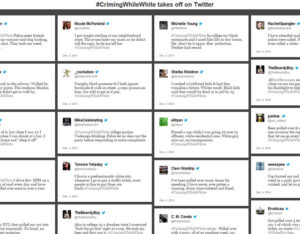
Or at least pretends to be less tolerant of racism.
There are all sorts of online mediums from hashtags to Tumblr pages that are dedicated to criticizing racism in America and the popular faces that appear to be racist themselves.
Some believe it is a healthy way to spark serious discussions about race in America and give a voice to those who would otherwise be voiceless.
Others have deemed these digital mediums as ineffective forms of “hashtag activism” that serve no purpose in the greater scheme of things.
Most people agree that these virtual cries will never bring about real solutions.
Attempting to “embarrass” racist people online is a strategy that has always proven to be ineffective in the long run although the short run impact can be gratifying.
Stars like Donald Sterling and Paula Dean have been criticized for racism online and in the short term it seemed like the online movement was successful.
Donald Sterling was forced to sell the Los Angeles Clippers and Paula Deen’s products were ripped from grocery store shelves all across the country.
After a while, however, the hashtags shaming the stars went away and their many other business endeavors remained untouched. Their wealth and success lived on.
Then there are the presence of online movements like #CrimingWhileWhite that allow white people to go online and speak out against racism and acknowledge their own white privilege.
Even this, however, is not enough to spark change.
Some even argue that it could be problematic.
There is a theory that such social media movements only allow white people to dump their guilt online without contributing to real solutions.
“But the problem is that there is no possible demonstration of prejudice and privilege that cannot also be appropriated by white people in the service of demonstrating the purity of their own views, resulting in an endless vortex of uncomfortable, obnoxious earnestness,” writes Ryan Cooper, a national corresponded for The Week.

It allows people to passively give the perception of creating change without actually pushing for solutions.
That, ultimately, creates an environment of many problems with very few solutions and nobody to take responsibility.
Wagging a finger at people who make racist comments or even virtually persecuting officers who have been accused of racial profiling will ultimately never end systemic racism.
Even if the Darren Wilsons or the Daniel Pantaleos of law enforcement were indicted, it would leave an entire pool of other racist officers patrolling the streets.
Incarceration rates of Black males would still be skyrocketing and racially driven police tactics like stop and frisk would still be alive and well.
Horrible racist rich people or violent racist officers can be taken down one by one but that mission would be a never ending one.
Instead, if the nation wants to eliminate systemic racism it will have to reform the very systems that foster it.
“Prison and sentencing reform, ending the drug war, overhauling American policing, and implementing quota-based affirmative action would be a good start,” Cooper explains. “…If the root of racism is in our structures, then structural policy should be the solution.”


